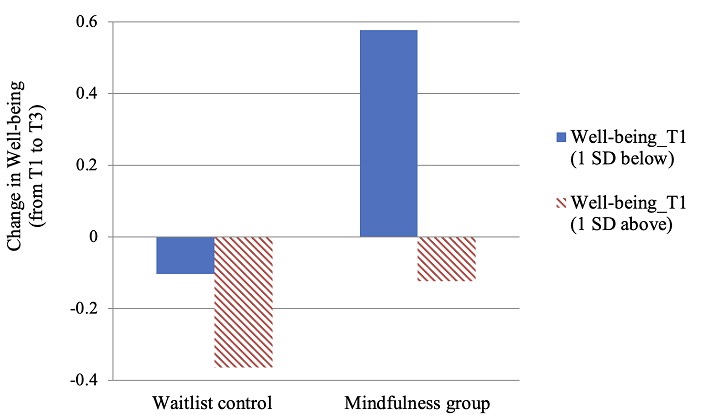Project Evaluation
To examine the effectiveness of mindfulness training, questionnaire surveys will be used before and after the intervention from the Jockey Club “Peace and Awareness” Mindfulness Culture in Schools Initiative (JC PandA) to obtain quantitative data. The outcome measures include stress level, positive and negative effect, emotional management, life satisfaction and general health. In addition to quantitative data, qualitative data such as participants’ feedback and suggestions will also be obtained. Changes in school culture will be tracked. The experiences of the schools will provide invaluable information on how mindfulness could be integrated into the local school curriculum and how mindfulness culture could be developed.

Effectiveness Study:Mindfulness training enhance teachers’ quality of life and mental well-being
JC PandA conducted a randomized control trials (RCT) in the 2019/20 academic year, and discovered that teachers who participated in mindfulness training (eight-week .b Foundations Course) reported significantly higher levels of life satisfaction, positive affect, general health, along with significantly lower levels of insomnia, stress, and negative affect than the control group at post-test and two-month follow-up.
The study showed that the benefit of eight-week mindfulness training is not only limited to teachers’ personal well-being, but also translated into higher level of mindfulness in their teaching. They reported to be more open, accepting and sensitive to their students’ needs. The effect is significant after training, and sustained 2 months after the training as well.
|
Mindfulness training (n = 94) Mean Score |
Waitlist control (n = 92) Mean Score |
|||||
| T1 (Pretest) | T2
(Post-test) |
T3 (2-month follow-up) |
T1 (Pretest) | T2
(Post-test) |
T3 (2-month follow-up) |
|
| ↑ General Health | 3.53 | 3.68*** | 3.71*** | 3.50 | 3.43 | 3.48 |
| ↓ Insomnia | 2.22 | 1.91*** | 1.87*** | 2.14 | 2.21 | 2.12 |
| ↓ Stress | 2.70 | 2.55*** | 2.48*** | 2.71 | 2.79 | 2.75 |
| ↓ Negative Affect | 2.82 | 2.59** | 2.42*** | 2.8 | 2.81 | 2.77 |
| ↑ Positive Affect | 3.35 | 3.58*** | 3.58*** | 3.38 | 3.32 | 3.30 |
| ↑ Life Satisfaction | 3.44 | 3.65** | 3.67*** | 3.40 | 3.38 | 3.38 |
| ↑ Emotion Management | 3.54 | 3.59* | 3.58 | 3.37 | 3.35 | 3.40 |
| ↑ Mindfulness in Teaching | 3.52 | 3.58* | 3.62* | 3.52 | 3.48 | 3.49 |
Table 1. The effectiveness of eight-weeks mindfulness training.
Note.Participants responded on a 5-point Likert scale from 1 (“Never”) to 5 (“Always”). ***p< .001, **p< .01, *p < .05
Mediation analysis indicated that mindfulness training indirectly benefitted students by enhancing teachers’ personal well-being, which in turn enhances mindfulness in teaching.

Figure 1. The mediated effect of mindfulness training on participants’ mindfulness in teaching at 2-month follow-up
(T3) through their well-being at post-intervention (T2).
The results indicated a worth-noting phenomenon: teachers with lower baseline in well-being benefitted the most from the mindfulness training. Compared with their counterparts with higher baseline, they show a significant improvement in terms of well-being.

Figure 2. Moderating role of baseline (T1) well-being in the effect of mindfulness training on participants’ well-being
at post-intervention (T2; upper panel) and at 2-month follow-up (T3; lower panel).
The above results have been published in international academic journal. You may read the details from:https://rdcu.be/cxVmI.



